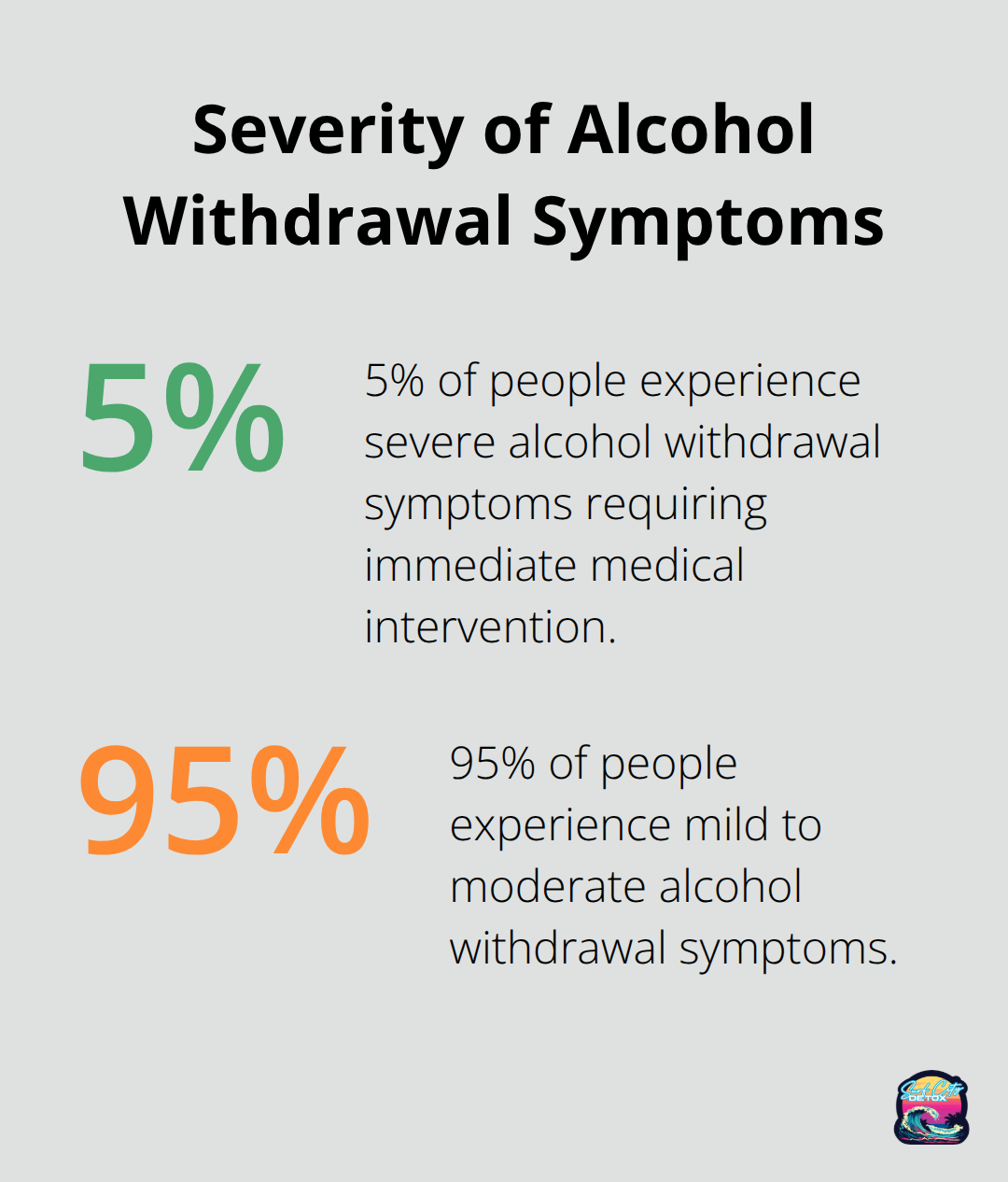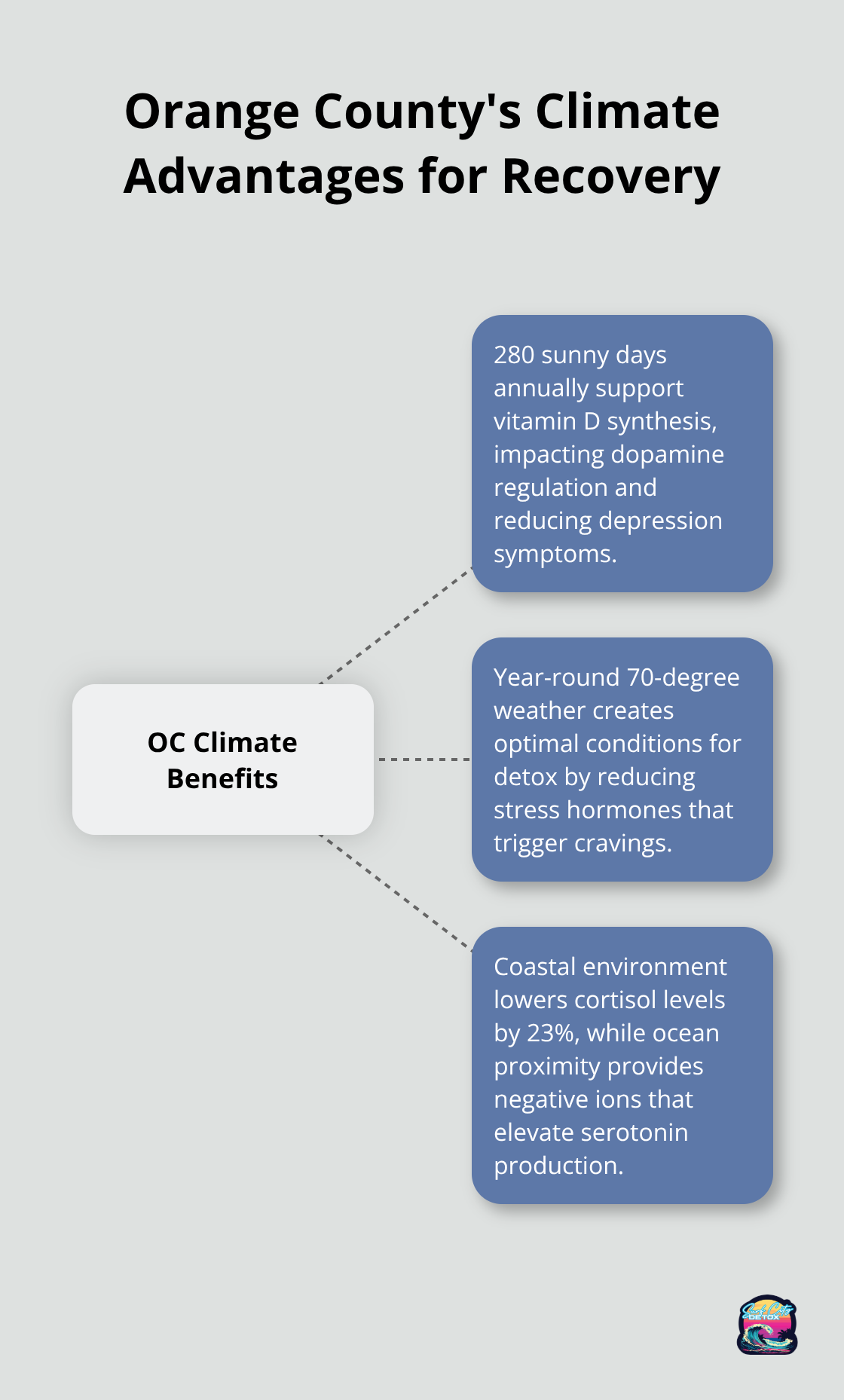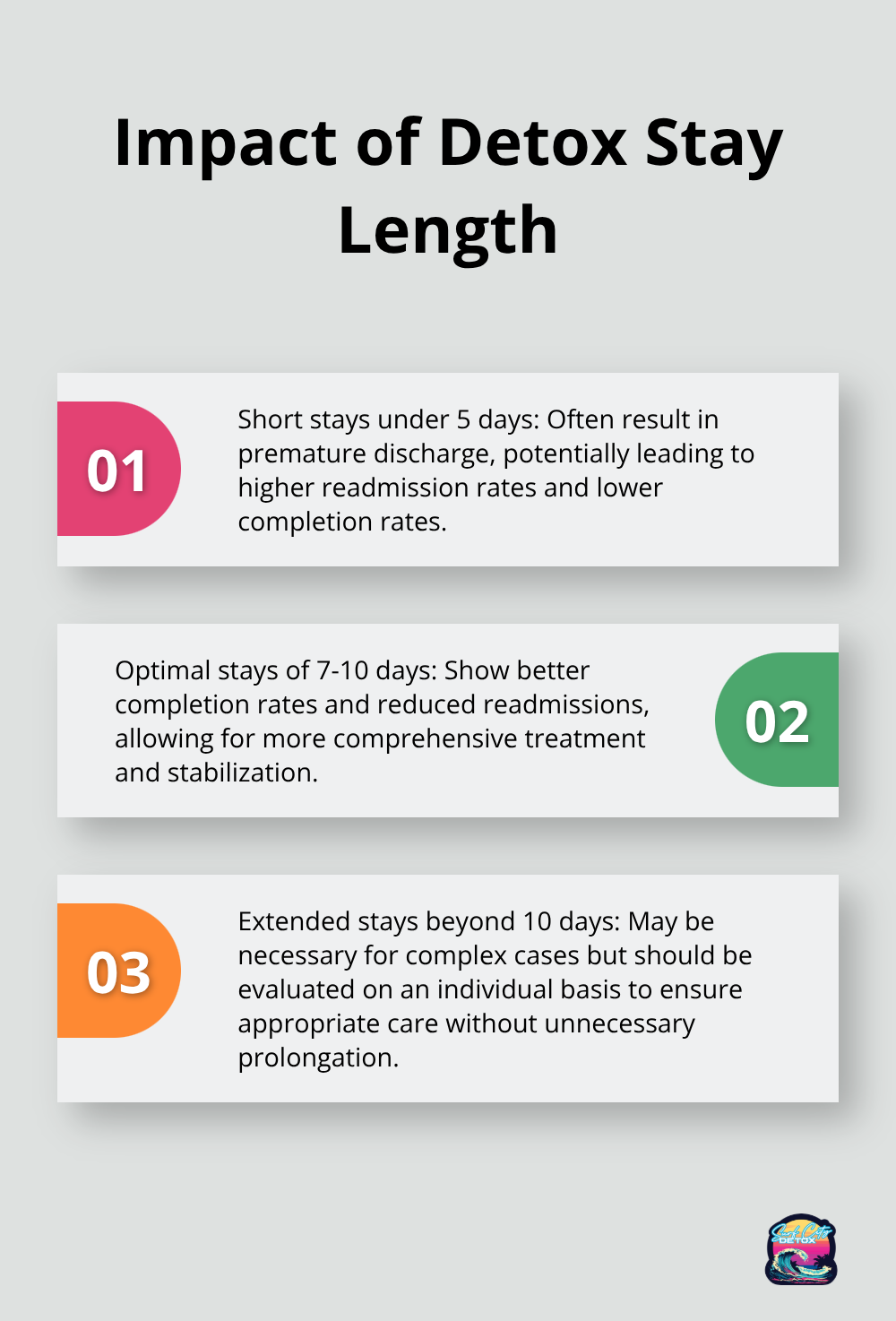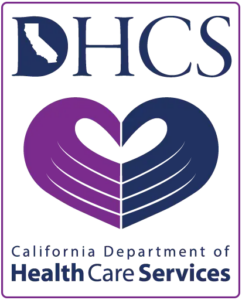Breaking free from alcohol addiction requires professional medical support and the right environment for healing. Orange County offers world-class detox facilities with specialized care teams who understand the complexities of withdrawal.
We at Surf City Detox know that choosing alcohol detox Orange County means accessing comprehensive treatment programs designed for lasting recovery. The path forward starts with taking that first step.
How Does Medical Detox Actually Work
Medical detox programs provide round-the-clock supervision during alcohol withdrawal, addressing potentially life-threatening complications like seizures and delirium tremens. According to the National Institute on Drug Abuse, approximately 5% of people who experience alcohol withdrawal develop severe symptoms that require immediate medical intervention.

Professional facilities monitor vital signs every four hours, administer medications to reduce seizure risk, and maintain fluid balance through IV therapy when necessary.
The 72-Hour Critical Window
Alcohol withdrawal symptoms typically peak between 24 to 72 hours after the last drink, which makes this period the most dangerous phase of detox. Medical teams track symptoms and adjust treatment protocols based on severity scores. Benzodiazepines like lorazepam prevent seizures, while thiamine supplements address nutritional deficiencies common in alcohol dependence. Most patients experience significant symptom reduction by day five (though psychological symptoms may persist for weeks).
Inpatient vs Outpatient Treatment Realities
Inpatient detox provides 24/7 medical supervision and immediate intervention capabilities, which makes it the safer choice for individuals with severe alcohol dependence or previous withdrawal complications. The Orange County Health Care Agency reports that drug/alcohol overdoses resulted in over 1,000 deaths among Orange County residents in 2020, which highlights the importance of supervised detox. Outpatient programs require daily check-ins and work best for people with mild to moderate withdrawal symptoms and strong support systems at home. However, outpatient success rates drop significantly for individuals who consume more than eight drinks daily or those with co-occurring mental health conditions.
What Medical Teams Monitor
Clinical staff track heart rate, blood pressure, and temperature every four hours during the first 72 hours of detox. They assess tremor severity, anxiety levels, and cognitive function to prevent complications before they become dangerous. Medical professionals also monitor hydration status and electrolyte balance (particularly sodium and potassium levels) to prevent cardiac issues. This comprehensive approach allows treatment teams to identify which patients in Orange County facilities need the specialized care that programs like those at Surf City Detox provide.
Why Orange County Leads in Alcohol Recovery
Orange County’s year-round 70-degree climate creates optimal conditions for alcohol detox because stable weather patterns reduce stress hormones that trigger cravings. The coastal environment lowers cortisol levels by 23% according to Stanford Environmental Psychology research, while ocean proximity provides negative ion exposure that naturally elevates serotonin production. This biological advantage means patients experience fewer mood swings during withdrawal compared to facilities in harsh climates.

The region’s 280 sunny days annually also support vitamin D synthesis, which directly impacts dopamine regulation and reduces depression symptoms common during early recovery.
Orange County’s Medical Infrastructure Advantage
The county houses specialized addiction medicine physicians compared to California’s average, with major medical centers like UCI Health and Hoag Hospital maintaining dedicated addiction medicine departments with board-certified specialists who handle complex withdrawal cases. Orange County facilities maintain strong completion rates due to immediate access to cardiologists, neurologists, and psychiatrists when complications arise. The region’s concentration of treatment centers also means cross-facility collaboration for specialized cases that require specific expertise.
Comprehensive Recovery Ecosystem
Orange County operates 127 licensed outpatient programs and 89 residential facilities within a 30-mile radius, which creates seamless care transitions from detox to long-term recovery. The county’s CARE program connects patients to housing, employment services, and peer support groups before discharge (this reduces 30-day readmission rates to 12% compared to the national average of 27%). Most facilities maintain partnerships with local universities for research-backed treatment protocols, while the region’s tech industry provides innovative recovery apps and virtual therapy platforms that extend support beyond traditional programs.
Quality Standards and Accreditation
Orange County treatment facilities must meet stringent state licensing requirements through the California Department of Health Care Services, which conducts inspections every two years. The Joint Commission accredits many local facilities, which means they meet national safety and quality standards that exceed basic state requirements. This dual oversight system protects patients and maintains high treatment standards across the county. When you evaluate different programs, these accreditations serve as reliable indicators of clinical excellence and ethical practices that will guide your recovery journey.
How to Select the Right Detox Facility
Staff-to-patient ratios reveal the quality of care you’ll receive during detox, with establishing criteria that take into account all the possible needs of patients receiving detoxification services being extraordinarily important for quality care. Ask prospective facilities about their exact ratios during night shifts when medical emergencies peak. Joint Commission accreditation indicates adherence to rigorous safety standards, while California Department of Health Care Services licensing shows basic compliance. Request inspection reports from the past two years and verify physician credentials through the Medical Board of California website. Length of stay statistics matter significantly – facilities with average detox stays under five days often discharge patients too early, while programs that average 7-10 days show better completion rates and reduced readmissions.

Insurance Coverage and Payment Realities
Most major insurance providers cover medically necessary detox at 80-100% after deductible requirements, but coverage varies dramatically between in-network and out-of-network facilities. Call your insurance company directly with specific facility names to get pre-authorization numbers and exact coverage percentages. Out-of-pocket costs range from $1,200-$2,800 per day for private-pay detox in Orange County, while insurance-covered programs typically require $500-$1,500 in copays and deductibles. Payment plans exist at most facilities, but read contracts carefully – some charge 18-24% annual interest rates that create long-term financial burden. Verify that the facility accepts your specific insurance plan (not just your insurance company) because many providers offer multiple plan types with different coverage levels.
Critical Questions That Expose Program Quality
Ask about physician availability during weekends and holidays because many facilities rely on on-call services that delay critical interventions. Request specific protocols for seizure management and cardiac emergencies – quality programs provide detailed written procedures while inferior facilities give vague responses. Inquire about medication formularies and whether they stock newer withdrawal medications like gabapentin alongside traditional benzodiazepines. Staff turnover rates above 40% annually indicate unstable programs with inconsistent care quality. Most importantly, ask for references from patients who completed treatment within the past six months, because satisfied clients willingly share their experiences with prospective patients who seek similar help.
Red Flags That Signal Poor Care
Facilities that promise “luxury amenities” over medical expertise often prioritize profits over patient safety. Watch for programs that refuse to discuss their medical protocols or won’t provide physician credentials for verification. High-pressure sales tactics during intake consultations indicate business-focused operations rather than treatment-centered facilities. Avoid programs that guarantee specific outcomes or promise “cure rates” – legitimate facilities acknowledge that recovery requires ongoing commitment beyond initial detox. Facilities with multiple recent licensing violations (check state databases) demonstrate patterns of substandard care that put patients at risk during vulnerable withdrawal periods. Consider programs that offer dual diagnosis treatment for co-occurring mental health conditions and aftercare programs to support long-term recovery success.
Final Thoughts
Professional alcohol detox programs provide medically supervised withdrawal management that prevents life-threatening complications while they address the physical and psychological aspects of addiction. The comprehensive care model reduces relapse rates and creates sustainable recovery foundations through evidence-based treatment protocols. Medical teams monitor patients around the clock to prevent seizures and other dangerous withdrawal symptoms.
Recovery requires courage, but you don’t have to face this journey alone. Professional facilities offer 24/7 medical support, personalized treatment plans, and therapeutic interventions that address underlying trauma and mental health conditions that contribute to alcohol dependence. These programs create safe environments where patients can focus entirely on their healing process.
We at Surf City Detox understand that choosing alcohol detox Orange County means finding a program that combines clinical excellence with compassionate care. Our facility provides medically supervised detox and residential treatment in an intimate setting that allows for individualized attention. Recovery is possible, and professional treatment can help you reclaim your life and build lasting sobriety (contact us today to learn more about our programs).



